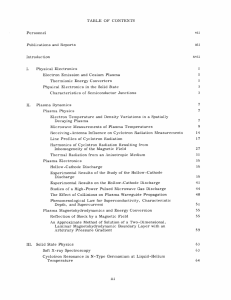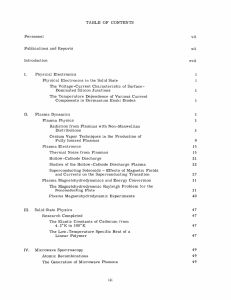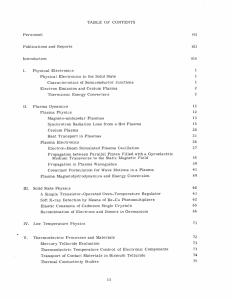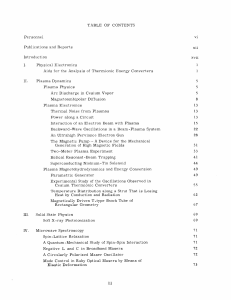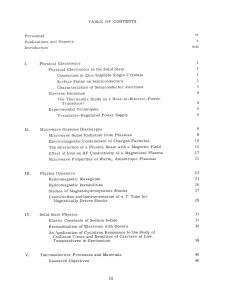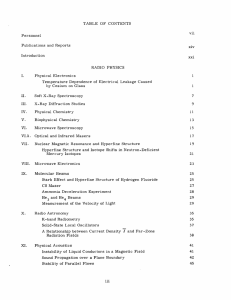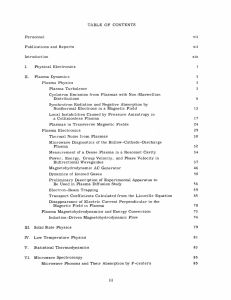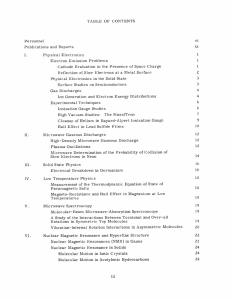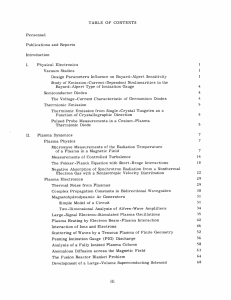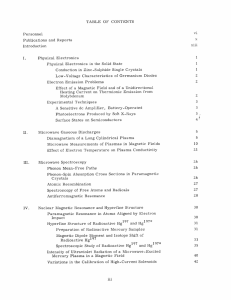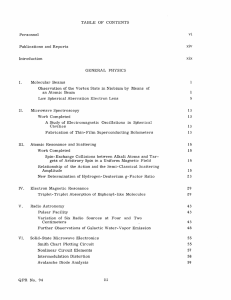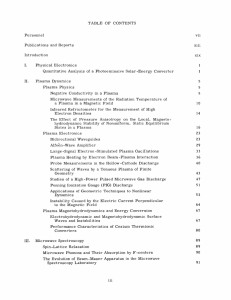TABLE OF CONTENTS
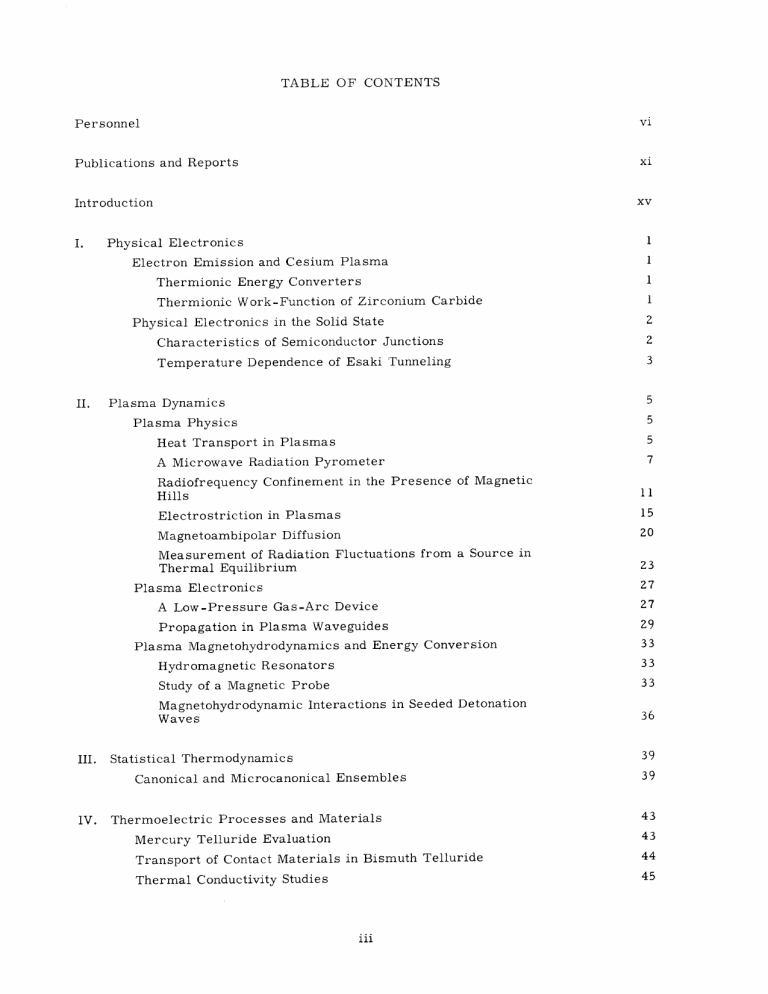
TABLE OF CONTENTS
Personnel
Publications and Reports
Introduction
I. Physical Electronics
Electron Emission and Cesium Plasma
Thermionic Energy Converters
Thermionic Work-Function of Zirconium Carbide
Physical Electronics in the Solid State
Characteristics of Semiconductor Junctions
Temperature Dependence of Esaki Tunneling
II. Plasma Dynamics
Plasma Physics
Heat Transport in Plasmas
A Microwave Radiation Pyrometer
Radiofrequency Confinement in the Presence of Magnetic
Hills
Electrostriction in Plasmas
Magnetoambipolar Diffusion
Measurement of Radiation Fluctuations from a Source in
Thermal Equilibrium
Plasma Electronics
A Low-Pressure Gas-Arc Device
Propagation in Plasma Waveguides
Plasma Magnetohydrodynamics and Energy Conversion
Hydromagnetic Resonators
Study of a Magnetic Probe
Magnetohydrodynamic Interactions in Seeded Detonation
Waves
III. Statistical Thermodynamics
Canonical and Microcanonical Ensembles
IV. Thermoelectric Processes and Materials
Mercury Telluride Evaluation
Transport of Contact Materials in Bismuth Telluride
Thermal Conductivity Studies
23
27
27
29
33
33
33
11
15
20
5
7
5
5
36
39
39
43
43
44
45 vi xi xv
2
2
1
1
3
1
1
CONTENTS
V. Microwave Spectroscopy
Ruby Linewidth
Paramagnetic -Resonance Experiments on Samples with
Appreciable Electric Losses
Gain Bandwidth in Circuits with Negative L and C
VI. Nuclear Magnetic Resonance and Hyperfine Structure
Machine Calculation of Nuclear Resonance Spectra
Spin-Lattice Relaxation of I
Environments
Hyperfine Structure of Hg
1
Level-Crossing Technique in Various Chemical
: An Application of the
Photomultiplier Bridge for Magnetic-Scanning Experiments
Intensity and Linewidth of an Electrodeless Discharge Lamp in a Magnetic Field
Hyperfine Structure of the 3P1 State of Hg
1 9 9
Nuclear Orientation by Optical Pumping
VII. Microwave Electronics
Two-Gap Klystron Cavities
VIII. Molecular Beams
Charged Atoms
Cesium Maser
Precision Measurement of the Hyperfine-Structure Constants of the Stable Bromine Isotopes
IX. Modulation Theory and Systems
FM Reception with Coherent Interference and Random Noise
X. Statistical Communication Theory
Waveform Signals with Minimum Spectral Width
Measurement of Correlation Functions
Design of Binary, Synchronous Pulse-Transmission Links
XI. Processing and Transmission of Information
A Method of Picture Coding
Estimating Filters for Linear Time-Variant Channels
XII. Physical Acoustics
Scattering of Sound by Sound
Sound Attenuation in Aluminum Rods
57
60
62
63
64
57
57
57
79
79
83
83
83
86
87
87
53
53
53
54
109
109
115
117
117
119
89
89
93
99
CONTENTS
XIII. Speech Communication
Speech Analysis
Detectability of Small Irregularities in a Harmonic
Line Spectrum
XIV. Signal Detection by Human Observers
Color Vision
XV. Communications Biophysics
Electrical Responses to Acoustic Clicks Recorded from Human Scalp
Repetitive Cortical Responses to Acoustic Clicks
Firing Patterns of Single Cells in the Auditory Cortex
XVI. Neurophysiology
Hydration of Biological Macromolecules
Logically Stable Nets
Many-Valued Logics and Neuronal Nets
Note on Deaths and Fits of Formal Neurons
Form-Function Relations in the Retina
Hearing Senses in the Frog
Optic-Nerve Functions in the Rat
Olfactory Sense in Amphibia and Reptilia
Devices for Use in Biological Measurements
Electrochemilumine scence
XVII. Circuit Theory
High-Order Frequency Multiplication with Varactors
XVIII. Network Synthesis
On the Analysis and Synthesis of Single-Element-Kind
Networks
XIX. Satellite Time-Dilation Measurement
Gravitational Red Shift Investigation
XX. Sensory Aids Research
Research Objectives
Discriminatory Thresholds for the Sense of Touch
XXI. Shop Notes
Short Spiral Baffles
121
121
122
127
127
137
137
143
150
175
175
177
177
161
161
161
163
163
166
167
168
169
170
171
179
179
181
181
182
185
185
